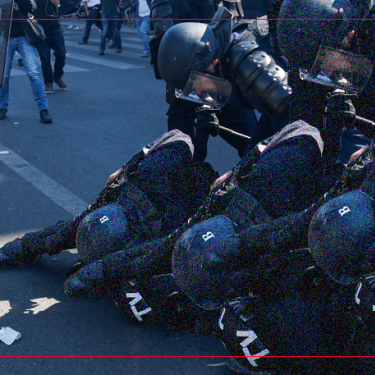French interior minister must stop police violence against reporters covering pension reform protests

Many reporters covering the current protests against France’s pension reform have been subjected to arbitrary arrests, assaults and intimidation by the police. Reporters Without Borders (RSF) calls on the interior minister to remind the security forces of their obligation to protect journalists and their rights during public events.
French police violence against the media had fallen significantly in the past two years but, since the adoption of the pension reform on 16 March, several journalists covering protests have been victims of violent behaviour by the security forces, or even abusive measures, such as unjustified arrest and other arbitrary measures. Incidents were reported in Paris and other cities. In each of the cases registered and verified by RSF, the journalists were clearly identified as members of the “press.”
“The lack of a prior declaration of intent to stage a protest in no way excuses the arbitrary obstruction of reporters covering the protest or the police attacks against them. RSF strongly condemns this new wave of police violence and abusive police measures and calls on the Minister of the Interior, Gérald Darmanin, to remind the security forces of their obligation to respect the rights of journalists and protect them in accordance with the provisions spelled out in the National Law Enforcement Plan (SNMO).
The cases of two photo-journalists with the Hans Lucas agency are among the most serious. One, Raphaël Kessler, was covering a protest in Paris on 20 March when he was trapped between two CRS riot police cordons on or near Boulevard Beaumarchais. When he tried to prove to the police that he was a journalist by showing them a letter from his agency, he was told it was out of date. Although he quickly got the agency to send a new letter, he was taken into custody at a police station near the Olympiades district and was held for 20 hours without being charged and without being given any explanation. “Aside from the lawyer who was assigned to me, no one was aware of what freedom of the press meant,” he told RSF.
The other Hans Lucas agency photo-journalist, Angéline Desdevises, was photographing a protest in the Place Saint-Anne in Rennes on 16 March when she was thrown to the ground and held there by two CRS police officers. She told RSF that they held her against the ground for about 30 seconds although she was shouting “press, press” and was clearly identifiable by the press card attached to her camera. Furthermore, she had previously positioned herself so as not to interfere with the ongoing police intervention. Shortly before this attack, she was part of a group of journalists targeted by a police officer with a “defensive ball” launcher. Two days earlier, on 14 March, a police officer called her a “big whore” after he asked her to leave a protest and she responded that she was a journalist. Finally, on 21 March, she was subjected to sexist and intimidating remarks by a police officer while she was covering a protest near the Triangle metro stop. “Sexual and gender-based violence are weapons of repression against women and gender minorities at demonstrations,” she said.
Rémy Buisine was filming the protests in Paris for Brut on 21 March when he was attacked twice by police officers and prevented from working. Several other journalists were thrown to the ground by a police charge in Paris on 21 March although they had previously been keeping a distance from the intervention of the security forces. The day before, a clearly angered police officer used his shield to violently push back several journalists, including Rémy Buisine, who were legitimately trying to take a picture of his identity and organization reference system (RIO).
In Paris on 18 March, Clément Lanot, a photo-reporter for the CL Press agency, was picking up his equipment – which had been knocked to the ground by a baton blow – when a CRS police officer mimed kicking him in an intimidatory manner. Amar Taoualit told RSF that he was covering the protests in Paris on 16 March for Loopsider, when a teargas grenade was deliberately fired at him and he was threatened with a baton although he was alone at the time, far from the crowd, on Place Vendôme, and despite having his press card.
All of these incidents constitute breaches of the National Law Enforcement Plan (SNMO), which says: “The presence of journalists during demonstrations is of paramount importance. It makes it possible to report on the opinions and demands of the demonstrators (…) as well as the intervention of the public authorities and the police.” The interior ministry adopted the new SNMO in December 2021 after consulting with journalists’ representatives and with RSF. For reporters to be able to benefit from their specific rights and from protection by the police when covering protests, they must be able to identify themselves to the police by means of a French press card or international press card or a signed standard letter from a media organization (a copy of which is appended to the SNMO).
France is ranked 26th out of 180 countries in RSF's 2022 World Press Freedom Index.
